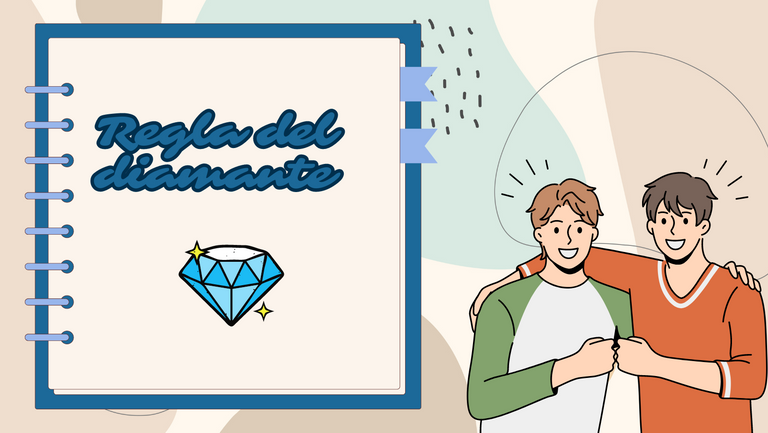

Muchas veces hemos escuchado esa "regla" en la que se nos dice "trata al otro como te gustaría ser tratado", o su versión negativa, "no hagas lo que no quieres que te hagan".
Sin embargo, aunque esa es una regla de oro, y para llegar hasta allí hay que dar grandes pasos, hoy te propongo otra posibilidad que conocí hace poco:
Tratar al otro como le gustaría ser tratado
Se parece, pero no es lo mismo, quizás tú tienes unas preferencias particulares y podrías pensar que a otra persona también le puede gustar, pero no necesariamente es así.
Para poner un ejemplo práctico te voy a compartir la historia de dos amigos llamados Carlos y Luis, quiénes estaban compartiendo una tarde de videojuegos cuando de pronto Carlos frotándose el estómago dijo: "Tengo hambre, ¿te parece si pedimos algo por delivery?"
Luis levantando una ceja respondió. "Sí, buena idea. ¿Qué te provoca?", a lo que Carlos con una gran sonrisa respondió: "¿Qué te parece si pedimos sushi? Me encanta."
Luis se encogió de hombros y respondió: "Vale, nunca lo he probado, pero si a ti te gusta a mí me parece bien."
Después de que llega el pedido, ambos comienzan a comer y Carlos saboreando su sushi dice: "Este está delicioso, ¿no te gusta?"
Frunciendo el ceño, Luis respondió: "No, no me gusta para nada, pero lo pediste tú, es tu casa y la verdad no quería arruinarte la noche." Carlos, sorprendido, se disculpó diciendo: "Discúlpame, no sabía que no te gustaba. ¿Por qué no me lo dijiste antes?"
Luis se encogió de hombros y dijo: "No quería molestarte, hubiese preferido una pizza. Pero ahora me siento mal porque tengo hambre y no puedo disfrutar de la cena."

Aquí podemos ver como aunque había buena intención, el amigo no consideró las preferencias de su amigo y ese desconocimiento generó una situación incómoda que tuvo como desenlace que ambos se sintieran mal.
Es importante que tratemos de entender cuáles son las necesidades y los intereses del otro, ponerse en su lugar y ser empáticos. Esta regla de diamante es algo que te recomiendo tener presente siempre, ya que aunque sea positivo querer tratar al otro como a ti te gustaría, poder corresponderle realmente como a él le gusta ser tratado es aún mejor.
Buscando un poco en internet descubrí que existe un libro que se llama "Regla del diamante" donde explican un poco más este tema, sin embargo, yo te comparto un poco de lo que aprendí en esta charla, te dejo ese dato por si te gustaría investigar más.
Particularmente llamó mi atención esa regla, porque estábamos hablando sobre el liderazgo y la actitud con el otro, cuando una compañera dijo que muchas veces las personas no tratan al otro como debería ser, sino como creemos que se debe sentir bien y muchas veces eso puede ser incómodo.
Tenía razón, entre gustos y colores no han escrito los autores, todos tenemos gustos diferentes y aunque nos regimos por ciertas normas y quizás la mayoría pueda inclinarse hacia ellas, no podemos asumir que todos pensarán igual o tendrán las mismas necesidades.
Por ejemplo, yo siento que muchas veces las personas se olvidan de las personas con discapacidad y que no existen suficientes espacios adecuados para que se sientan cómodos. Este tema creo que guarda mucha relación con la inclusión, si tenemos un acceso a un lugar con unas escaleras muy hermosas, yo con mis piernas perfectamente sanas puedo cruzarlas, pero ¿cómo podría pasar una persona en silla de ruedas? Se trata de no pensar solo en ti, y ponerse en el lugar del otro.


Many times we have heard that "rule" in which we are told "treat others as you would like to be treated", or its negative version, "don't do what you don't want them to do to you".
However, although that is a golden rule, and to get there you have to take big steps, today I propose another possibility that I learned about recently:
Treat the other as you would like to be treated.
It's similar, but it's not the same, maybe you have particular preferences and you might think that someone else might also like it, but it's not necessarily so.
To give you a practical example I will share the story of two friends named Carlos and Luis, who were sharing an afternoon of video games when suddenly Carlos rubbing his stomach said: "I'm hungry, do you think if we order something for delivery?
Luis raised an eyebrow and replied. Yes, good idea, what do you think?"_, to which Carlos replied with a big smile: "What do you think if we order sushi? I love it."
Luis shrugged his shoulders and replied, "Okay, I've never tried it, but if you like it I'm fine with it."
After the order arrives, they both start eating and Carlos tasting his sushi says: "This one is delicious, don't you like it?"
Frowning, Luis answered: "No, I don't like it at all, but you ordered it, it's your house and I really didn't want to ruin your night." Carlos, surprised, apologized saying: "I'm sorry, I didn't know you didn't like it, why didn't you tell me before?"
Luis shrugged his shoulders and said: "I didn't want to bother you, I would have preferred a pizza. But now I feel bad because I am hungry and can't enjoy dinner."
Here we can see that although there were good intentions, the friend did not consider his friend's preferences and that ignorance generated an uncomfortable situation that resulted in both of them feeling bad.
It is important that we try to understand what the other person's needs and interests are, put ourselves in their place and be empathetic. This diamond rule is something that I recommend you to always keep in mind, because although it is positive to want to treat the other person as you would like to be treated, being able to really reciprocate as he/she would like to be treated is even better.

Searching a little on the internet I discovered that there is a book called "Diamond Rule" where they explain a little more about this topic, however, I share with you a little of what I learned in this talk, I leave this information in case you would like to investigate more.
This rule particularly caught my attention, because we were talking about leadership and attitude towards others, when a colleague said that many times people do not treat others as they should be, but as we think they should feel good and many times that can be uncomfortable.
She was right, between tastes and colors authors have not written, we all have different tastes and although we are governed by certain standards and perhaps the majority may lean towards them, we cannot assume that everyone will think alike or have the same needs.
For example, I feel that many times people forget about people with disabilities and that there are not enough adequate spaces for them to feel comfortable. This issue I think is very much related to inclusion, if we have access to a place with beautiful stairs, I can cross them with my perfectly healthy legs, but how could a person in a wheelchair get through? It's about not thinking only about yourself, and putting yourself in the other person's place.

¡Hola Ambarvegas! Me parece muy interesante la "Regla de Diamante" que has compartido. Nunca había escuchado sobre este concepto antes, pero tiene mucho sentido. Me gusta cómo explicas que se trata de tratar a los demás como nos gustaría ser tratados, pero sin olvidar que todos somos diferentes y que nuestras necesidades y deseos también lo son. Es importante ser empáticos y respetar a los demás, y creo que esto es especialmente relevante en la sociedad actual donde hay tanta diversidad. ¡Gracias por compartir tu perspectiva!
Muchas gracias por leerme y también por tu comentario, a mí también me llamó la atención este concepto, se trata justamente de empatía, está bien pensar en hacer sentir bien al otro, pero a veces nos olvidamos de preguntar, y asumimos muchas cosas que a veces no son. Un abrazo.
Los seres humanos somos seres en relación, estamos siempre en contacto con los otros y me ha gustado como has elaborado esta reflexión querida amiga.
Gracias César,es así 😃👌🏽, estamos siempre en comunidad.